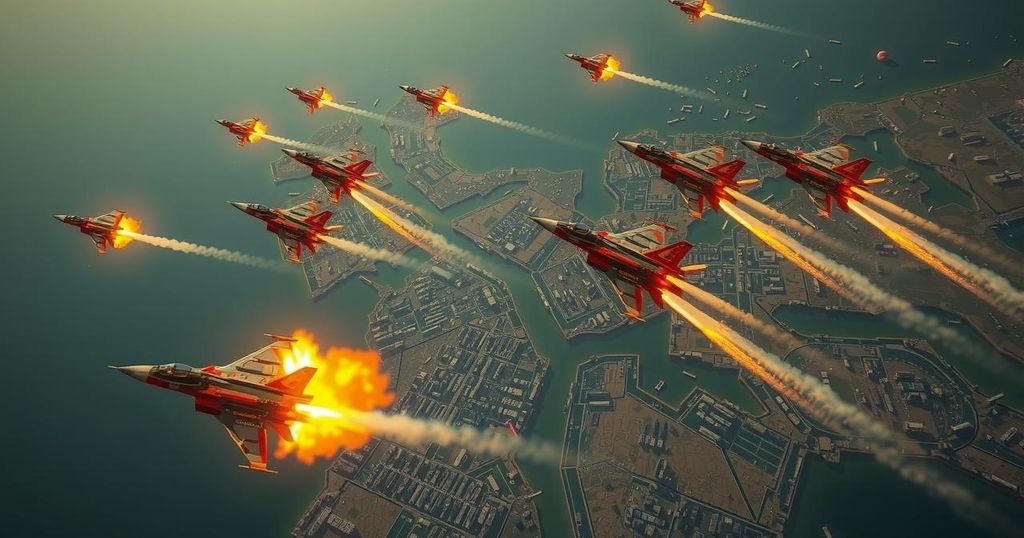Recent rocket fire from Lebanon resulted in the deaths of seven individuals in northern Israel, amid ongoing violence between Israel and Iranian-backed groups such as Hezbollah and Hamas. Diplomatic efforts for ceasefires are being made by U.S. officials in the region, while Israeli airstrikes in Syria target Hezbollah’s weapon stockpiling efforts. The conflict has led to thousands of casualties and mass displacement in Lebanon, as both sides remain entrenched in their positions, complicating ongoing negotiations for peace.
On Thursday, a barrage of rockets fired from Lebanon resulted in the deaths of at least seven individuals in northern Israel, marking the deadliest incident of such attacks since the escalation of conflict earlier this month. Among those deceased were four foreign workers, killed in separate locations amidst the ongoing hostilities. These attacks coincided with diplomatic efforts by senior U.S. officials in the region, aimed at brokering ceasefires in both Lebanon and Gaza, as the Biden administration seeks to mitigate the escalating violence involving Israel and Iranian-supported factions in the Middle East. Hezbollah, the Lebanese militant group, has been unleashing rockets, drones, and missiles into Israeli territory daily since Hamas initiated its deadly assault from the Gaza Strip on October 7, 2023. Both groups are recognized as ideological allies and Iranian proxies, having been designated as terrorist organizations by the U.S., Israel, and numerous other nations. In response, the Israel Defense Forces (IDF) conducted airstrikes on locations near Qusair in western Syria, alleging that Hezbollah had been stockpiling weapons for smuggling into Lebanon. Multiple airstrikes targeting border crossings have been reported, aimed at disrupting the arms smuggling routes. Consequently, Syrian news reports indicate that at least five individuals were killed in these strikes. The conflict saw considerable escalation last month when Israeli forces initiated extensive airstrikes in Lebanon, resulting in the death of Hezbollah’s high-ranking leaders, including Hassan Nasrallah along with most of his deputies. Following these events, Israeli ground troops entered Lebanon. The toll of the violence has been severe, with reports indicating that around 2,000 individuals in Lebanon have lost their lives due to Israeli airstrikes. The initial rocket attack on Thursday was reported by the Metula regional council in northern Israel, claiming the lives of five people, with further casualties occurring in a suburb of Haifa where a 30-year-old man and a 60-year-old woman lost their lives. According to the IDF, approximately 25 rockets fired from Lebanon during the explosion struck communal agricultural areas during harvest. Hezbollah’s newly appointed leader, Sheikh Naim Qassem, affirmed the group’s intent to continue their conflict with Israel until acceptable ceasefire terms are realized. “Hezbollah’s capabilities are still available and compatible with a long war,” he stated in a video message. The violence continues to displace vast numbers of people, with the Lebanese government reporting that more than 1.2 million citizens have been uprooted from their homes throughout the ongoing conflict, which has claimed in total over 2,800 lives in Lebanon and injured nearly 13,000. As mediating countries pursue proposals to end the escalating conflicts during the waning months of the Biden administration, the stalemate persists with no sign of resolution from the involved parties. Prime Minister Benjamin Netanyahu emphasized Israel’s resolve, indicating that any agreement should safeguard Israel’s security without relying on U.N. peacekeepers or Lebanese forces, whom it perceives as ineffective. In separate negotiations, the United States, along with Egypt and Qatar, offers a four-week ceasefire in Gaza contingent upon the release of hostages held by Hamas. However, the militant group remains reticent, demanding a more extensive ceasefire and a complete withdrawal of Israeli forces from Gaza, even subsequent to the assassination of its leader, Yahya Sinwar. The ongoing conflicts between Israel and Iran-backed groups have caused widespread devastation and loss of life, leading to political and humanitarian crises on both sides. Immediate resolutions are of paramount importance to prevent further casualties and instability in the region.
The current conflict between Israel and Iran-backed groups such as Hezbollah and Hamas has been characterized by increased hostilities since the outbreak of violence on October 7, 2023. The relations between these factions are deeply rooted in ideological allegiance and mutual support, having each been categorized as terrorist organizations by the United States and many allied nations. The recent escalation prompted Israeli military operations aimed at dismantling militant capabilities along the borders with Lebanon and Gaza. This ongoing conflict has resulted in substantial human casualties and extensive displacement among the civilian population, raising urgent calls for ceasefire negotiations. Mediators, including U.S. officials, are actively seeking to establish terms for peace as violence continues to ripple through the region.
In summary, the conflict between Israel and Iranian-backed factions continues to escalate, as evidenced by recent rocket attacks leading to significant casualties and a series of retaliatory airstrikes by Israel. The humanitarian crisis deepens with countless lives lost and numerous individuals displaced due to the ongoing hostilities. Diplomatic negotiations are underway to establish ceasefires, yet the resolution appears elusive as neither side displays willingness to concede key demands. The situation remains dire, underscoring the urgent need for a sustainable peace agreement to prevent further loss of life and to restore stability in the region.
Original Source: www.cbsnews.com







